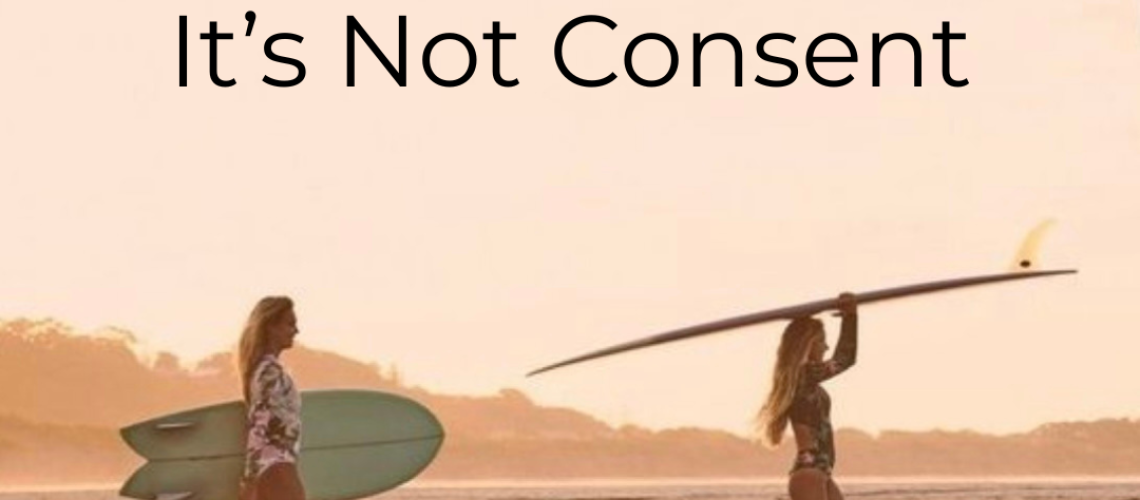Table of Contents Show
- Let’s Break This Down: How to Talk to Teens About Consent and What It Really Means
- How Gaslighting Blurs the Lines Around Consent
- What You Deserve to Know About Consent
- How to Talk to Teens About Consent Starts With Listening First
- A Moment From My Own Life
- One of the Best Ways to Talk to Teens About Consent (And We Talk About It at Home)
- Final Thoughts: Why This Matters So Much to Me
April is Sexual Assault Awareness Month. And one of the most important parts of that conversation is how to talk to teens about consent. And honestly?And honestly? I wish we didn’t need it. I wish we lived in a world where every kid grew up knowing what consent really means and how to recognize when it’s not there.
But we’re not there yet.
As a mom, a coach, and a survivor, I think about this all the time. I worry about my own kids. I worry about the high schoolers I work with. I even think about my friends’ kids. Because the truth is, so many teens and young adults are still figuring out what healthy relationships look like… and consent is a huge part of that. I want this to be something you can read with your teen, send to a friend, or share with someone you care about. If you’ve ever wondered how to talk to teens about consent, this is a place to start. I hope it opens up conversations. I hope it helps someone feel seen. I hope it helps someone stay safe.
Because figuring out how to talk to teens about consent can feel overwhelming—and I want this to make it easier.
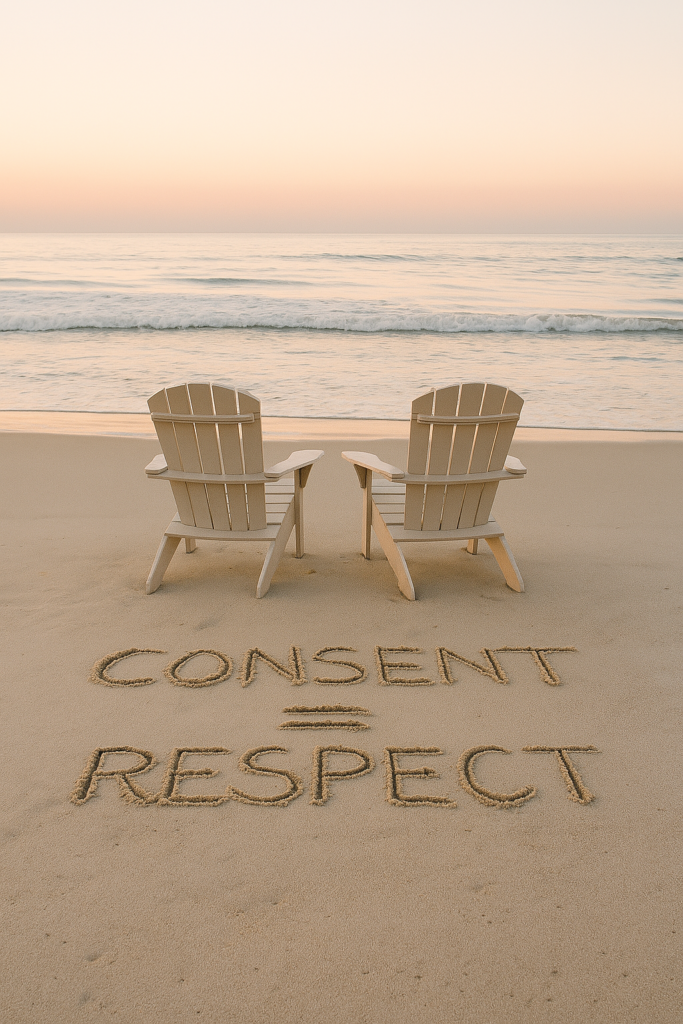
Let’s Break This Down: How to Talk to Teens About Consent and What It Really Means
We need to stop acting like this is confusing.
Consent is not complicated. People just make it sound that way to excuse bad behavior.
So let’s break it down.
- “No” means no.
- “Stop” means no.
- “I’m tired” means no.
- “Not now” means no.
- “I’m not sure” means no.
- “I don’t know” means no.
- “I’m not ready” means no.
Let me say it louder:
No does not mean “convince me.”
Consent should be clear, enthusiastic, and freely given.
It can be taken back at any time.
It’s not silent. It’s not assumed. It’s not something you owe anyone—even someone you’re dating. Even someone you love.
If it’s not a full, confident, “Yes, I want this”—then it’s not consent.
And here’s something that’s not said enough:
If you’re drunk or high, you can’t consent—and no one else should be trying to get a yes out of you.
Consent under the influence isn’t real consent.
And if someone uses alcohol or drugs to take advantage of you? That’s not a misunderstanding.
That’s assault.
How Gaslighting Blurs the Lines Around Consent
One of the hardest things about consent, and how to talk to teens about consent, is that it’s not always as obvious as people think it is.
We grow up hearing “no means no,” but what about all the times someone doesn’t feel safe saying no? Or when they freeze? Or when they say things like “I don’t know” or “I’m not sure,” and the other person just keeps pushing?
Sometimes, it’s not about someone ignoring your no, it’s about them twisting your reality so much that you start questioning whether you really had the right to say no in the first place.
That’s gaslighting.
It sounds like:
- “You never said no.”
- “You didn’t stop me.”
- “You were into it.”
- “You didn’t say anything, so I thought it was fine.”
- “You’re making this a bigger deal than it is.”
Or even this:
- “You were drunk/high, so how could you really say no?”
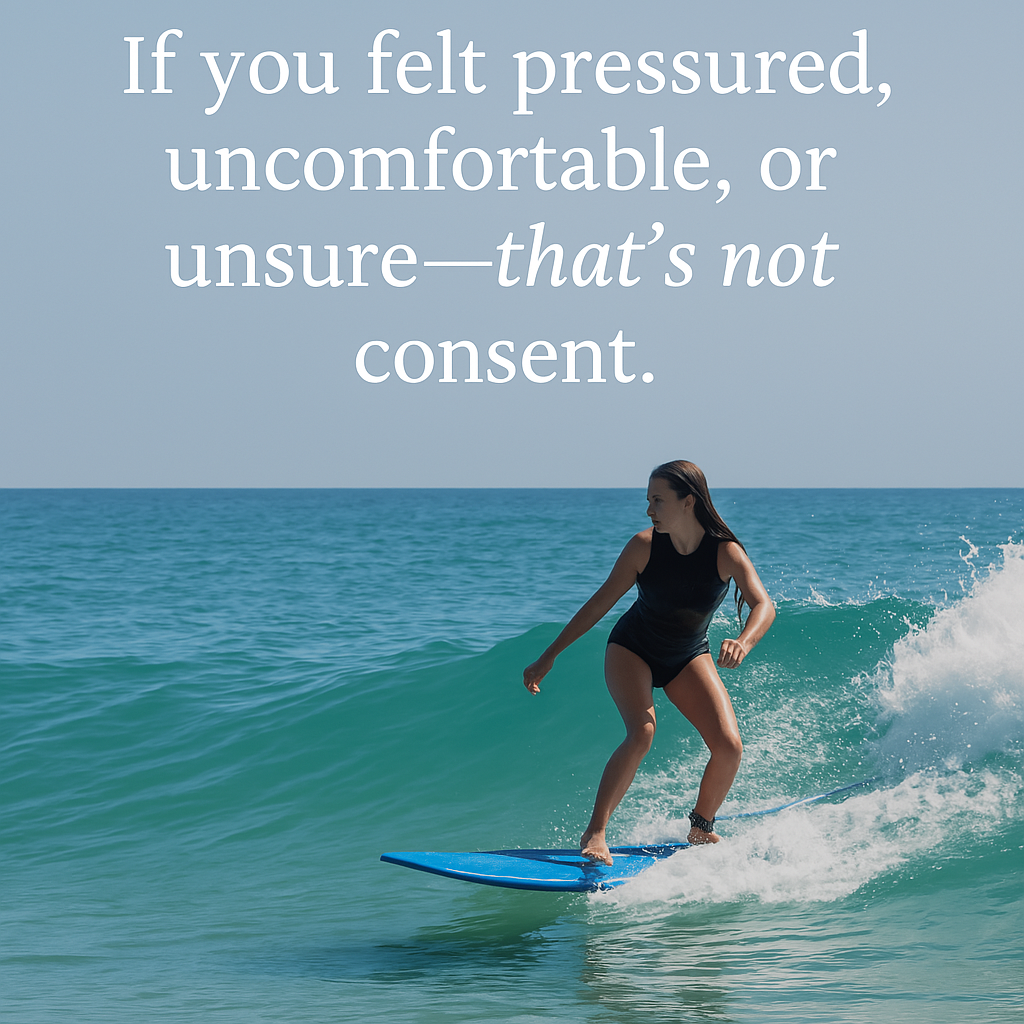
Here’s the truth:
If you felt pressured, unsure, uncomfortable, scared, or manipulated… that’s not consent.
If someone only backed off after you cried, froze, or gave in just to get it over with… that’s not consent.
And if alcohol or drugs were involved, and your mind wasn’t clear enough to make that choice—that’s not consent either.
If you’re reading this and realizing that something you experienced wasn’t okay… I’ve been there.
I know what it’s like to wonder if it “counts.”
It does.
And you matter.
It wasn’t your fault. You are not alone.
Abuse, even sexual assault, can be buried under charm, excuses, and silence in a relationship, just like it was in It Ends With Us, where so many red flags were hidden beneath romance.
What You Deserve to Know About Consent
Ever had a moment where you weren’t sure how to say no, so you just kind of froze or gave in?
Or maybe someone acted like you said yes… even though you didn’t?
Yeah. That stuff happens more than people talk about.
Dating, hooking up, figuring out relationships—it’s a lot.
And if you’ve ever felt pressure from someone you like, from your friends, or from what you see online, you’re not alone.
There’s so much noise out there about what’s “normal” or what you’re “supposed” to do.
But here’s the thing:
Most people are still figuring this stuff out. And a lot of what we’ve been told about consent is either wrong, oversimplified, or missing the most important parts.
So let’s be clear, especially when we’re thinking about how to talk to teens about consent and what they really deserve to know:
- You don’t owe anyone access to your body—ever.
- Flirting doesn’t mean you’re agreeing to anything.
- Saying yes once doesn’t mean you can’t say no the next time.
- You can change your mind. You can stop in the middle. You don’t need a reason, and you don’t need permission.
If someone keeps pushing, pressuring, guilting, or trying to wear you down—that’s not okay.
That’s not love. That’s not normal. And it’s definitely not respect.
You deserve to feel safe and heard.
You deserve to feel in control of your body and your choices.
You deserve someone who listens when you speak and cares about how you feel, not just what they want.
And if something already happened that left you confused or uncomfortable…
You’re not being dramatic.
You don’t have to prove anything.
If it didn’t feel right, that’s enough.
You’re allowed to trust yourself.
You’re allowed to talk about it.
You don’t have to carry it alone.
And hey—if no one has said this to you yet:
You’re not weird. You’re not broken. You’re not the only one.
You’re just human. And you deserve real respect.
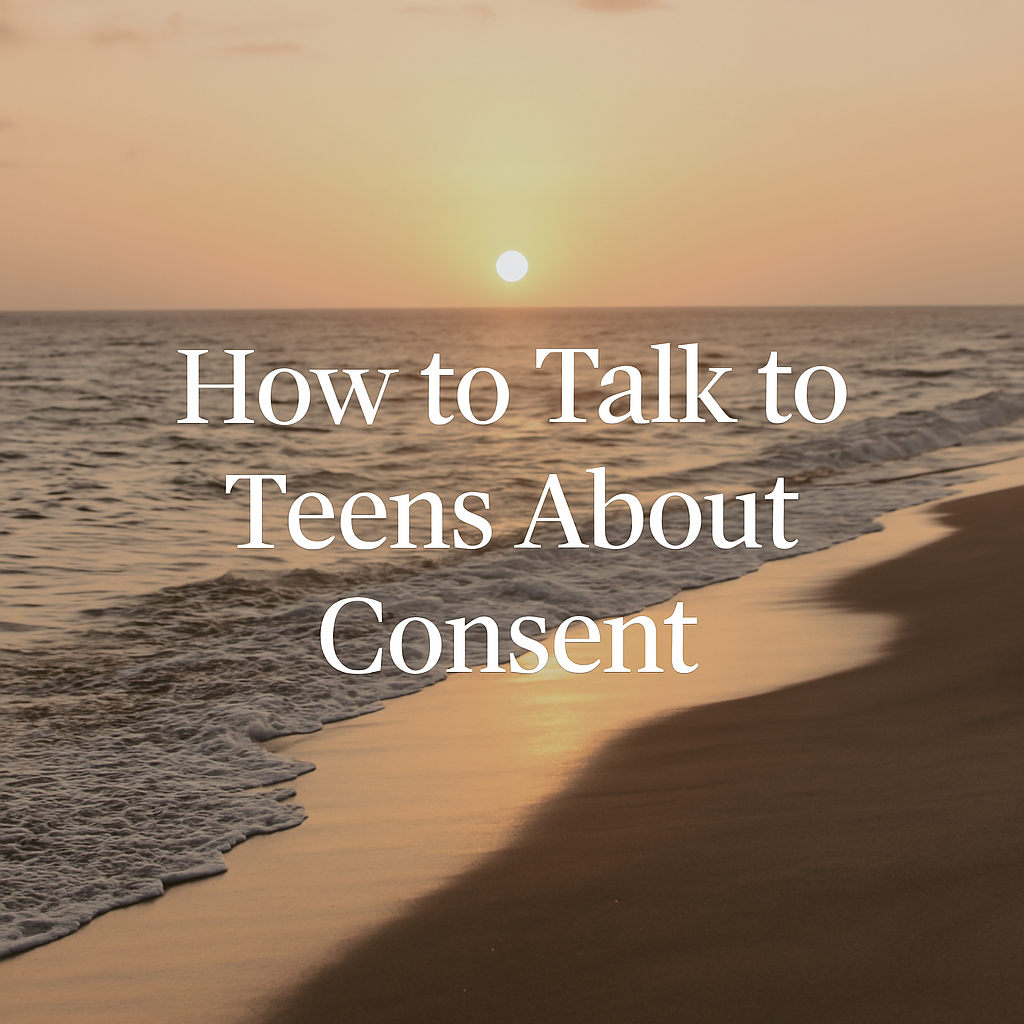
How to Talk to Teens About Consent Starts With Listening First
How to Talk to Teens About Consent (Without the Eye Roll or the Lecture)
Talking to your kids about consent can feel intimidating.
You might worry you’ll say the wrong thing. Or make it awkward. Or get met with an eye roll and a quick “I know, Mom.”
But here’s the thing: even when they act like they’re not listening, they are.
Even if they don’t respond, your words still land.
Even if you’ve never talked about it before, you can start now.
Consent isn’t just a one-time conversation.
It’s a series of small, casual, everyday moments—where they start to understand that their boundaries matter. That their voice matters. That your home is a safe place to figure things out.
So don’t worry about getting it perfect. Just be real.
Instead of sitting them down for a big “talk,” try saying things in passing like:
- “Hey—just so you know, if you’re ever in a situation that doesn’t feel right, I hope you’ll tell me even if it’s messy. Even if you’re scared, I’ll be upset. I won’t be.”
- “If anyone ever makes you feel uncomfortable or unsure, even a little, that matters. You can always come to me. I’ll listen first.”
- “Consent isn’t just about saying no. It’s about feeling safe and respected. Every single time.”
You can bring it up during a car ride, while watching a movie, or even when a song lyric makes you cringe.
No lecture. No pressure. Just planting seeds.
And don’t stop at “no means no.” Go deeper. Talk about:
- What real consent sounds like (and what it doesn’t)
- Why “I don’t know” or silence isn’t a yes
- How alcohol and drugs can erase someone’s ability to give real consent
- That it’s okay to change your mind. To stop. To leave. No matter what’s already happened
And maybe, most importantly—model it.
Let them see what respect looks like in action.
Let them hear you set boundaries and honor them in return.
Let them know, not just through words but through the way you show up, that they deserve to feel safe in every relationship.
A Moment From My Own Life
I’ve had these talks with my daughter. Not perfectly, and not always at the right time, but I’ve made space for them because I have to. Because I know what it feels like to be pressured. I know what it’s like to freeze. I know how long it can take to realize something wasn’t okay.
One day, we were watching something together, and a character crossed a line. I paused it, not to scold or explain, but just to say, “That wasn’t okay. You could tell she didn’t feel safe, and that matters.”
She nodded. It wasn’t a long conversation. But I could tell she heard me. And maybe next time she sees something similar, or feels something herself, she’ll remember that moment.
Even if you didn’t grow up having these conversations, you get to be the one who starts it now.
You don’t have to be perfect. You just have to keep showing up.
One of the Best Ways to Talk to Teens About Consent (And We Talk About It at Home)
There’s one video I always come back to when I’m talking about consent, especially with teens. It’s called Tea Consent, and it uses something as simple as a cup of tea to explain what consent should actually look like.
It’s clear. It’s clever. And it makes a point that sticks.
We’ve watched it in my house because it takes the pressure out of a heavy topic and makes the message easy to understand and talk about.
It cuts through the excuses. It makes things black and white, without making it boring or preachy.
This might be one of the easiest ways to talk to teens about consent—because it’s simple, clear, and kind of unforgettable.
It uses something as ordinary as tea to explain consent in a way that actually sticks.
👇 Watch the video right here:
And here’s what I love most about it:
If someone doesn’t want tea, you don’t make them drink it.
If they said yes to tea earlier but don’t want it now, you don’t try to convince them.
If they’re asleep, you definitely don’t pour tea down their throat.
It’s simple. But it’s powerful.
So whether you’re a parent trying to figure out how to start the conversation, a teen wondering what the line actually looks like, or someone who’s just not sure what “counts”—start here.
Watch it. Talk about it.
It’s five minutes that could change how someone sees consent forever.
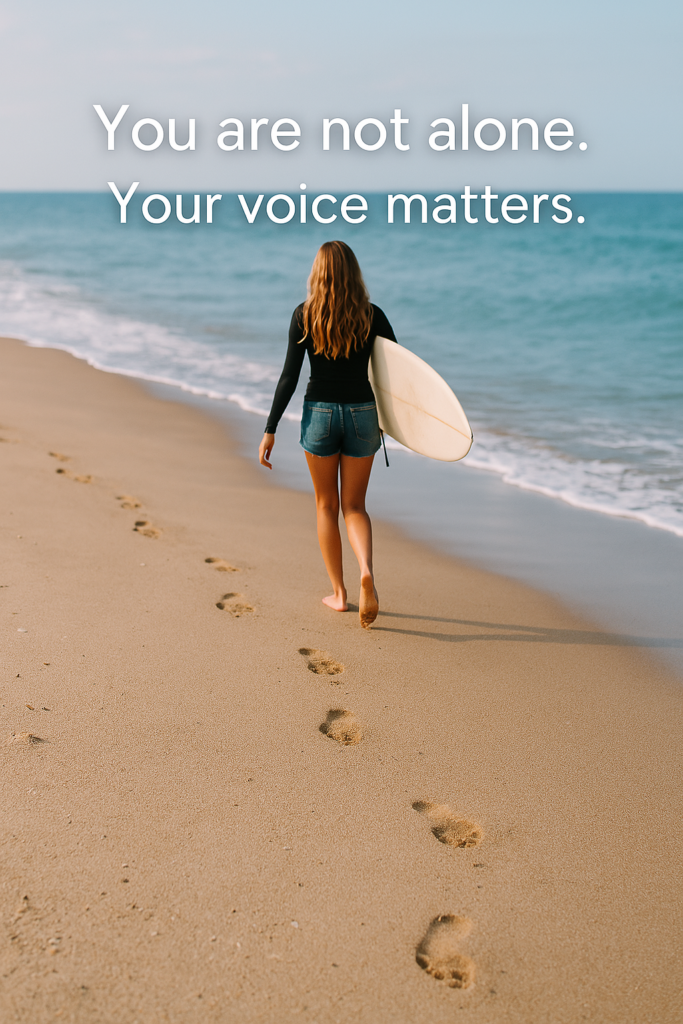
Final Thoughts: Why This Matters So Much to Me
I didn’t grow up having conversations about consent.
Heck—I didn’t even grow up having real conversations about sex.
Not about what it meant. Not about how it should feel. Definitely not about what to do if something felt off or uncomfortable.
So, for a long time, I didn’t have the words for what had happened to me.
I didn’t realize I could say no.
I didn’t realize what I experienced wasn’t okay.
And by the time I started to understand it… the damage had already been done.
That’s why this matters so much.
Because I want better for my kids. For your kids. For every teen and young adult trying to figure out love, relationships, and boundaries in a world that rarely explains any of it well.
And I know how hard it can be to figure out how to talk to teens about consent in a way that actually sticks—without making it awkward or feeling like a lecture.
Consent shouldn’t be complicated.
Respect shouldn’t be negotiable.
And no one should ever walk away from an experience wondering if it “counts” or if they somehow let it happen.
If this post made you pause… if it made you remember… if it helped you find words for something you’ve never said out loud—please know:
You are not alone.
You are not too sensitive.
You are not overreacting.
And your voice matters.
So please—send this to someone. Share it with your teen. Use it as a way to start the conversation that so many of us never got to have.
Because this isn’t just about one moment.
This is about what we’re teaching the people we love about boundaries, about respect, and about what they deserve.
Keep talking.
Keep showing up.
It matters more than you know.
And if you’re not sure where to start, or you want help having these conversations in a way that actually lands, I’m here.
I work with parents, teens, and young adults to help them recognize red flags, build healthy boundaries, and talk about relationships in a way that feels safe, real, and doable.
If you’re still wondering how to talk to teens about consent or how to make these conversations feel less overwhelming, I’m here to support you.
Whether you’re trying to protect your kids, understand what healthy love looks like, or figure out how to talk to teens about consent in a way that really sticks—you’re not alone.
👉 Explore my coaching sessions
👉 Or connect with me directly here
Because this work matters.
And so do you.


